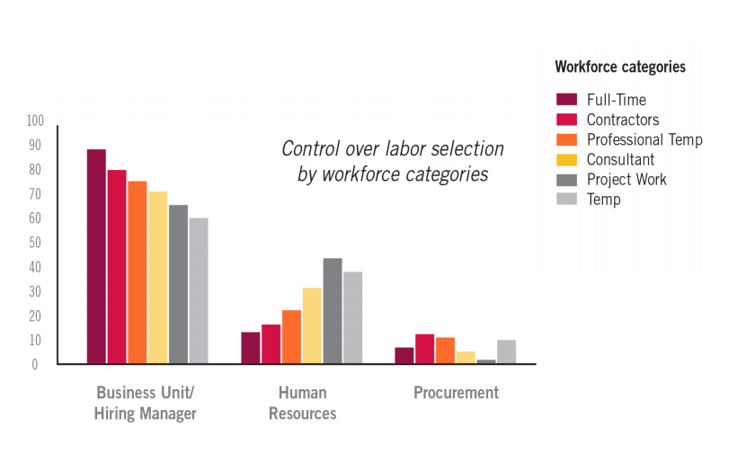A growing number of companies are outsourcing work and business processes to cut costs and stay competitive. In fact, the global outsourcing market reached a staggering $85.6 billion in 2018. If you’re ready to jump on the bandwagon and embrace this trend, research your options beforehand. Decide whether you want to hire a contingent worker, team up with freelancers or employ staff on a contractual basis
.
Tip
Outsourcing is a form of contingent work. Despite their similarities, there are some subtle differences between the two.
Outsourcing at a Glance
American companies outsource about 300,000 jobs annually. This practice isn’t just cost-effective, but it can also boost your productivity and revenue. When you outsource work, you get access to a huge talent pool and intellectual capital. As a small business owner, you might not afford to hire top talent on a full-time basis. Labor outsourcing services, on the other hand, allow you to work with skilled professionals at a fraction of the cost.
Modern technologies like machine learning, blockchain, virtual reality and artificial intelligence are disrupting the business world. Companies worldwide are leveraging outsourcing capabilities to keep up with these trends and remain competitive. In a 2015 survey_, 59 percent of respondents said that the cost of outsourcing IT security services_ are the same as or lower than hiring an in-house team. Plus, it elongates the need to train their staff and install new infrastructure.

Approximately 31 percent of businesses outsource work in order to provide higher quality services to their clients; another 59 percent see it as an effective cost-cutting tool. Outsourcing can also free up employees’ time, allowing them to focus on core business operations. This practice drives innovation and gives you access to world-class capabilities. From accounting and payroll to digital marketing, it is now possible to outsource every aspect of your business.
How Does Outsourcing Work?
Running a business involves more than just selling products or services to potential clients. Business owners are responsible for accounting, recruiting, customer service, product development, marketing and so on. On top of that, they must constantly adapt to the latest industry trends and embrace new technologies. Each of these tasks requires different skills and capabilities.
If you own a small business, you may lack the resources needed to fill these roles. That’s where outsourcing comes in. An outsourced employee can perform certain job functions, such as project management or bookkeeping. Instead of hiring an in-house copywriter, for example, you can outsource this role to an independent contractor who works remotely.
This practice can save you time and money. First of all, you won’t have to pay a monthly salary and benefits. Independent contractors charge per hour or per project, which allows you to cut costs. You can further lower your expenses by outsourcing services to China, India and other non-Western countries. Big names like Google, Opera, WhatsApp, Slack and Skype rely on outsourced web development, customer support, marketing and more.
What Is a Contingent Worker?
The terms outsourcing and contingent work are often used interchangeably. Despite their similarities, they’re not one and the same. According to the U.S. Department of Labor, contingent workers are independent professionals or contractors, self-employed individuals, temporary contract workers, on-call workers or persons who don’t expect their job to last. In general, this employment arrangement is temporary and involves payment on a piece work basis.
A contingent worker can be a freelancer or independent contractor offering outsourcing services. However, he or she may also work on a temporary basis without being employed by a particular company. The U.S. Department of Labor points out that wage and salary workers who have been working for an organization for more than a year and expect to work there for at least an additional year fall into this category too.
Almost six million people held contingent job*s* in 2017. In general, their work is non-permanent or involves alternative employment arrangements. Construction workers, for example, are usually employed on a project basis, so they don’t expect their jobs to last. They’re responsible for their own taxes and don’t receive salaries, health insurance and other benefits.
Outsourcing vs. Contracting
Outsourcing is a sub-category of contingent work. Both practices can add value to your business and reduce overhead expenses. But what’s the difference between outsourcing and contracting?
Business owners often blur the line between these concepts. After all, contracting is a form of outsourcing – the difference lies in the level of control that your organization has over the work process. Generally, when you subcontract work, you reach out to a highly specialized company or person and ask them to work on a project or perform specific tasks under a contract or formal agreement. The contractor provides the skills and resources needed for the job and must adhere to strict guidelines.
With outsourcing, you have less control over the work process. You still sign a contract and have rules in place, but the terms and conditions are largely set by the service provider. Contracting, on the other hand, gives you more control over the workflow. Additionally, companies offering these services typically own the infrastructure and equipment required for your project, such as trucks, heavy machines, servers, or software programs.
What Services Can Be Outsourced?
Companies choose to outsource work for various reasons. Most times, they do it when they need help with new projects or tedious tasks that keep them from focusing on core business activities. Let’s say you own a web design agency. One way to grow your business is to diversify your services; for example, you may outsource copywriting and digital marketing in order to provide customers with more options.
This approach will enable you to reach a wider audience and improve customer experience. In the long run, it may increase your sales and revenue. By outsourcing small, time-consuming tasks, you can focus on the things that matter most, such as customer acquisition or product development.
Most businesses outsource administrative tasks, human resources, IT operations, marketing or customer service. A small company, for instance, might not have enough capital to set up its own HR department and recruit top talent. So, this business may decide to outsource HR to an independent contractor. This professional will post job ads online, screen suitable candidates, interview them and so on. You may also outsource payroll processing, event management, logo creation, web design and much more.
Are There Any Drawbacks?
Both outsourcing and contingent work have their pitfalls. A major disadvantage is the risk of data loss. For example, if you outsource customer service or payroll services, the person handling these tasks may use employee and customer data for other purposes. This could put your business at risk and lead to lawsuits or hefty fines.
Another potential drawback is the lack of customer focus. An outsourced employee will most likely work with multiple clients at once. Therefore, he or she may not be able to fully focus on your project and meet your expectations.
Always have a backup plan. Independent contractors are volatile, and can vanish into thin air. They can go out of business or book a vacation exactly when you need them most. Consider these aspects before signing an agreement with a service provider.


